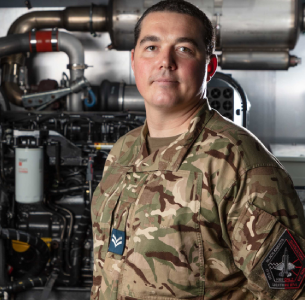
Can you tell us about your career to date?
I moved into Tanker Maintenance Facility (TMF) where I completed my HGV engineering NVQ level 3. TMF is responsible for the maintenance and repair of RAF Marham’s aircraft refueling fleet.
As you can imagine, this is an important task, as without TMF the aircraft would be unable to fly. At all times flight safety is paramount, and therefore we must go about our maintenance activities with a considerable amount of care and precautionary action. This includes a tagging system to ensure that all tools removed from the toolkit are accounted for and before any vehicle leaves the bay, a 100% check is carried out. We must always be mindful of Foreign Object Debris (FOD), as it could easily migrate to the airfield and cause catastrophic damage to equipment.
I then started a Foundation Degree in General Engineering with Staffordshire University via distance learning. I was asked to take on the role of Acting Corporal in TMF for six months until I went on tour to the Falklands.
How have you managed to sustain your studies and your day-job? What support do you have and how do you organise yourself?
Studying a distance learning course has been quite demanding, it is not easy when you are stuck to get guidance. I have found the internet to be a great tool, as well as various engineering textbooks that I purchased. I roughly spend twenty to thirty hours a week studying. The studying doesn’t affect my day-job, but I do have to attend Laboratory sessions for one day every semester per module. I study two per semester and my management here at RAF Marham release me on these occasions to attend.
What posting are you moving on to next? What do you hope to be doing?
After my four-month tour to the Falklands, I returned to RAF Marham, and started working in Forward GEF (FGEF) in an Acting Corporal role. The integration of the F35 at RAF Marham was well underway, while Tornado was on a drawdown; however, until last year the Tornado was still on operations in the Middle East and FGEF worked alongside the Tornado Squadrons, supporting them as they trained and prepared for their deployments. I now work on the new support equipment for the F35.
What do you most enjoy about your trade group and the type of work you do?
I enjoy the fact that we work on such a wide variety of equipment, with the various bays available, we tend to move around quite a lot. I believe that diversity is the key to survival in this job. My colleagues within the trade group are generally like-minded people, and it makes working within this environment desirable.
Tell me about your future career plans with the RAF?
I was promoted to Corporal earlier this year, and I would like to remain here at RAF Marham working on 617 Sqn alongside the F35. Now I will be focused on building a portfolio to further progression to Sergeant. I believe that the skills and knowledge I have makes me an excellent candidate to the TG5 trade training environment.
What has motivated you to become registered as EngTech? Would you recommend it to others in your position?
I pursued EngTech registration to obtain recognition for my skills and experience. I am interested in what is happening globally within engineering, and I know as a member, I will have access to all the latest engineering information in various sectors. I am hoping it will give me an idea of what I would like to do when I leave the RAF, I hopefully have plenty of time left, but I do not want to leave it too late to decide. Membership then could provide me with the networking needed to get the right job once it comes to the time. For these reasons, I would recommend EngTech registration to all of my peers.